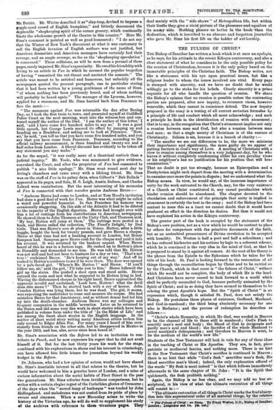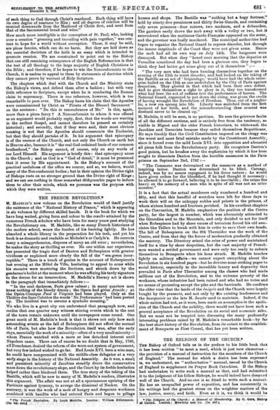1111. FULNESS 01' CHRIST.•
TnE Bishop of Zanzibar has written a book which is at once an apologia, as he says, for his attitude in the recent Kikuyu controversy, and also a clear statement of what he considers to be the only possible policy for the reunion of Christendom, because it is the only policy based on the immutable principles of the Christian faith. The Bishop writes, not like a statesman with his eye upon practical issues, but like a religious leader to whom the issues involved are vital. Every page is stamped with sincerity, and we have no doubt that he would willi gly go to the stake for his beliefs. Clearly sincerity is a prime requisite for all who handle the question of reunion. We share the Bishop's opinion that no reunion is possible unless the contracting parties are prepared, after new inquiry, to renounce views, however venerable, which they cannot in conscience defend. The new inquiry proposed in the essay is a testing of all current sectarian formulas by a principle of life and conduct which all must acknowledge ; and such a principle he finds in the identification of reunion with atonement ; that is to say, in the recognition that Christ's atonement implies not only a reunion between man and God, but also a reunion between man and man ; so that a single society of Christians is of the essence of Christianity. Schism is sin, because it is a breach of charity :-
" The smaller we see our differences to be, the more we minimise their importance and significance, the more guilty do we appear of putting barriers in God's way of Love. A meeting of Christians with a view to reunion among themselves is a very judgment-day, for he who leaves it without completely condemning either his own peculiar views or his neighbour's has no justification for his position that will bear examination."
That no doubt is put too strongly, because an Episcopalian and a Presbyterian might each depart from the meeting with a determination to examine once more the points in dispute ; but we understand what tho Bishop means. In view, he would say, of the immense importance of unity for the work entrusted to the Church, nay, for the very existence of a Church as Christ constituted it, any casual peculiarities which hinder reunion should be abandoned. The chapter devoted to the elucidation and enforcement of the principle that unity is implied in atonement is certainly the best in the essay ; and if the Bishop had been content to issue this as a tract we cannot doubt that it would have produced an effect in the direction he desires. But then it would not have explained his action in the Kikuyu controversy.
The greater part of the book is occupied by the statement of the Bishop's own position, not as a view which he would be content to place by others for comparison with the primitive documents of the faith, but as an undoubted presentment of Divine revelation to be accepted with humility. Dr. Weston is half a poet and half a sehoolman ; and be has reduced his fancies and his notions by logic to a coherent scheme, which he is convinced is the very idea in the mind of God, so that lie is prepared to stand by it against all corners. At the root of his theory i3 the phrase from the Epistle to the Ephesians which he takes for the title of his book. St. Paul is looking forward to the restoration of all things through the reconciliation begun by Christ and to be carried on by the Church, which in that sense is " the fulness of Christ," without which He would not be complete, the body of which He is the head. And Christians have never ceased to look forward to a world which shall be perfectly reconciled to God, because perfectly animated by the Spirit of Christ; and in so doing they have seemed to themselves to be echoing the great Apostle's hope. But the " Spirit of Christ " is an expression which, though it satisfied St. Paul, does not satisfy the Bishop. He postulates three planes of existence, Godhead, Manhood, and God-in-manhood ; the third being absolutely necessary for one who is Mediator ; and the process of redemption he describes as follows :— " Christ's whole Humanity, in which He died, was needed in Heaven to be the channel of life to those still in manhood ; God's Flesh to sanctify man's soul and body ; the Blood of God to invigorate and purify man's soul and blood ; the Sacrifice of the whole Manhood to cover mankind's delinquencies ; and therefore to Heaven it went, to be the medium of the world's new life."
Students of the New Testament will look in vain for any of these ideas in the teaching of Christ or His Apostles. They are, in fact, pious patristic or mediaeval fancies, and nothing more. There is no hint in the New Testament that Christ's sacrifice is continued in Heaven ; there is no hint that while " God's flesh " sanctifies man's flesh, His blood sanctifies man's blood ; indeed, the only explanation offered of the words " My flesh is meat indeed " is that which follows immediately afterwards in the same chapter of St. John : "It is the Spirit that quickoneth, the flesh profiteth nothing."
Again, the Bishop is no less clear, and we may add no less un- scriptural, in his view of what the ultimate restoration of all things will consist in :—
" The ultimate restoration of all things in Christ marks the final absorp- tion into this supernatural order of all material things, by the relation
• Tho-Fulness of Christ: air Reny. By Frank Weston, D.D., Bishop of Zanzibar. London ; Longman' and Co. (Os. ostl
of each thing to God through Christ's manhood. Each thing will have its own degree of nearness to Him ; and all degrees of relation will be counted downwards from the Manhood of Christ first, and next from that of the Sacramental bread and wine."
How much more intelligible is the conception of St. Paul, who, looking over a creation " groaning and travailing with pain together," was con- tent to hope for a world without corruption. These, it may bo said, are pious fancies, which can do no harm. But they are laid down as the essential doctrines of the faith in an essay which is intended to promote reunion. We are constrained to point out to the Bishop that one still remaining consequence of the English Reformation is that the test of all theology to the large majority of English Christians is the Bible ; and therefore, if he hopes to win the Nonconformists to the Church, it is useless to appeal to them by statements of doctrine which they cannot prove by warrant of Holy Scripture.
The chapters which deal with the Church and the Ministry state the Bishop's views, and defend them after a fashion ; but with very little reference to Scripture, except when he is combating the Roman claim to supremacy. There is one reference, however, which is too remarkable to pass over. The Bishop bases his claim that the Apostles were commissioned by Christ as " Priests of the Blessed Sacrament " en the sentence : " Do this in remembrance of Me." Is this, again, more than a pious fancy ? A Nonconformist to whom it was offered as an argument would probably reply, first, that the words are wanting in the earliest Gospel, and cannot therefore be pressed as certainly historical ; and secondly, that if they were said, their most obvious meaning is not that the Apostles should consecrate the Eucharist, but that they should partake of it. In his argument that episcopacy is of the essence of the Church, and not only the Church on earth but in Heaven also, because it is " the real God-ordained basis of our common brotherhood," the Bishop cannot, of course, rely on any words of our Lord Himself. His argument is briefly this : that episcopacy arose in the Church ; and as God is a " God of detail," it must be presumed that it arose by His appointment. In the Bishop's account of the practical usefulness of the office we concur, and so, we believe, would many of the Nonconformist bodies ; but in their opinion the Divine right of Bishops rests on no stronger ground than the Divine right of Kings ; and we can see nothing in these somewhat dithyrambic pages to induce them to alter their minds, which we presume was the purpose with which they were written.













































 Previous page
Previous page